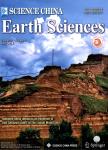Paleoenvironmental implications of high-density records in Co-rich seamount crusts from the Pacific Ocean
Paleoenvironmental implications of high-density records in Co-rich seamount crusts from the Pacific Ocean作者机构:Ministry of Education Key Laboratory for Earth Surface ProcessesDepartment of GeographyPeking UniversityBeijing 100871China National Research Center for GeoanalysisBeijing 100037China Guangzhou Marine Geological SurveyGuangzhou 510760China The Key Laboratory of Continental DynamicsNorthwest UniversityXi’an 710069China The Key Laboratory of Heavy Ion PhysicsMinistry of EducationPeking UniversityBeijing 100871China Institute of Mineral ResourcesChinese Academy of Geological SciencesBeijing 100037China
出 版 物:《Science China Earth Sciences》 (中国科学(地球科学英文版))
年 卷 期:2008年第51卷第10期
页 面:1460-1469页
核心收录:
学科分类:070704[理学-海洋地质] 0709[理学-地质学] 07[理学] 0707[理学-海洋科学]
基 金:the Key Laboratory of Marine Sedimentology and Environmental Geol- ogy, State Oceanic Administration (Grant No. MASEG200602) China Ocean Mineral Resources Research and Development Association (Grant No. DY105-01-04-05) Programme of Excellent Young Scientists of the Ministry of Land and Resources
主 题:Co-rich seamount crust micro-probe chronology geochemical record paleo-oceanic environment
摘 要:Co-rich seamount crusts have been shown to possess great potential for providing information on paleoceanographic and paleoclimatic changes. High resolution data are essential to decipher and correctly understand such high-density records. With the development of modern microprobe techniques, detailed sampling of crusts can be performed and it is possible to retrieve detailed information about envi- ronmental changes recorded in the seamount crusts. We report here geochemical results of more than 40 elements (including all rare earth elements) of four Co-rich seamount crust samples, which were collected from seamounts in the central and western Pacific Ocean. These data were obtained with two micro-probe techniques: Electron Probe Micro Analyzer and Laser Ablation Inductively Coupled Plasma Mass Spectrometry. The chronological framework of the seamount crust samples was determined using the cos- mogenic 10Be and the Co-chronometer. Records of elemental composition, P, and Al/(Fe + Mn) and Y/Ho ratios across the sections of the four samples are used to identify paleoceanographic and paleoclimatic events over the past ~30 Ma. These data show that: (1) Al/(Fe + Mn) in the western Pacific seamount crust is a useful proxy for the assessment of changes of source materials related to the variability of the Asian monsoon; (2) P and Y/Ho can be used as proxies to infer biogenic episodes. Finally we discuss the methodology related to dating and micro-probe analysis used in crust study.



